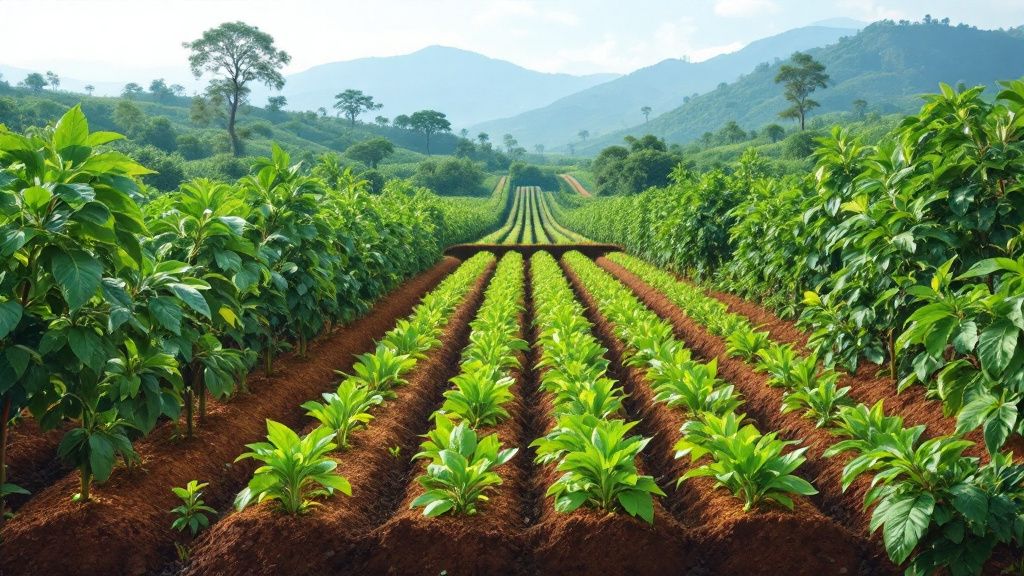Organic vs. Conventional Coffee: What’s the Difference?
When exploring the contrasts between organic and conventional coffee, you're essentially delving into how they are grown. Organic coffee is cultivated without synthetic fertilizers or pesticides, aiming for environmental sustainability. This means organic coffee beans often harbor a more natural aroma and flavor. On the other hand, conventional coffee may utilize chemical inputs to boost production, which can affect taste and eco-impact. As someone intrigued by these differences, understanding the benefits of organic coffee might lead you to appreciate its contribution to ecological health and possibly improved well-being, given its cleaner growing process.

Understanding Coffee Cultivation Techniques
The journey of coffee cultivation is steeped in rich history, offering insights into the very essence of your morning brew. Organic coffee farming traces its evolution from traditional agricultural practices long before the industrial age, where farmers relied on natural processes to grow their crops. This method emphasizes biodiversity and health, leveraging natural pest control and organic fertilizers. As you explore these age-old practices, you'll find that they are designed to nurture the land, resulting in organic coffee beans that promise purity and environmental harmony.
Moving to conventional methods, it's clear that the industrial revolution marked a pivotal shift. With technological advancements, fertilizers and pesticides became commonplace, enhancing yield but often sacrificing the benefits of organic coffee, such as environmental and personal well-being. Conventional techniques focus on maximizing production efficiency, sometimes at the expense of soil health and biodiversity. Understanding these two approaches gives you the perspective to appreciate the choices behind your coffee, highlighting not only the diversity in cultivation techniques but also their significant impacts on flavor and the planet.

Health Considerations of Organic vs Conventional Coffee
The health implications of your coffee choice are substantial when considering organic versus conventional options. Organic coffee frequently boasts a cleaner source, being free from synthetic chemicals. This absence of pesticides and fertilizers often translates into beans that are potentially less likely to carry residual chemicals into your cup, supporting a more health-conscious lifestyle.
In contrast, conventional coffee may contain traces of agricultural chemicals due to the farming techniques employed. These chemicals can raise concerns for those sensitive to additives or seeking more natural consumption. From a health standpoint, choosing organic coffee aligns with reducing exposure to potential contaminants.
Looking at the health debate through the lens of natural purity, one can see that organic coffee offers its own set of benefits. By sticking to traditional methods, organic coffee beans maintain inherent nutritional properties, potentially offering antioxidants that flourish in chemical-free environments. Such conditions could enhance both physical and mental wellness.
Understanding these differences allows you to weigh your coffee choices not just by taste but by the health impact you desire. Whether prioritizing purity or exploring flavors, the decision between organic and conventional ultimately rests on personal health priorities and lifestyle preferences.

Taste Differences Between Organic and Conventional Coffee
When savoring the nuances between organic and conventional coffee, you'll notice distinct taste profiles shaped by their cultivation processes. Organic coffee often presents a richer, more robust flavor, attributed to the natural growing environment free from synthetic additives. These organic coffee beans get their unique taste from the soil's natural nutrients, offering a potential purity that many coffee enthusiasts find appealing and authentic.
One of the challenges in discerning the taste of conventional coffee is overcoming the potential influence of chemical residues that might dull or alter the coffee's natural flavors. This issue can be addressed through selective brewing techniques that aim to refine the taste and draw out the desired flavors. While conventional coffee may deliver a consistent taste due to standardized farming practices, it often lacks the depth and vibrant notes that organic beans provide. Choosing between these types depends on the flavor profiles you prefer, whether looking for purity or consistency in your coffee experience.
Market Trends and Consumer Demand
Market trends in the coffee industry reveal a growing interest in organic products, reflecting a broader consumer shift toward sustainability and health consciousness. Many people are now prioritizing the benefits of organic coffee, including its environmental impact and perceived health advantages. This shift is driving roasters and producers to innovate, offering a wider range of organic options to meet increasing demand.
In the next few years, the demand for organic coffee is likely to surpass conventional offerings as consumers become more aware of the overall benefits associated with organic coffee beans. This bold prediction suggests a significant transformation in the market, pushing for more transparent and environmentally friendly farming practices.
The evolving consumer preference also highlights the importance of ethical sourcing. As more individuals seek out ethical choices, companies are feeling the pressure to comply with these expectations. This is shaping a market landscape where transparency, quality, and sustainability are key selling points, leading to an increased variety of ethically produced coffee.
 Ratio Eight S2
Ratio Eight S2
 Ratio Eight Original
Ratio Eight Original
 Ratio Six
Ratio Six
 Ratio Four
Ratio Four
 Compare Machines
Compare Machines






